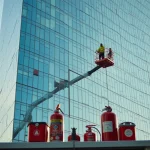Equipping your team with NRSWA Streetworks training increases their expertise and elevates overall project performance. These courses deliver practical skills and essential knowledge, ensuring legal compliance and safer worksites. Investing in certified training translates into greater confidence, fewer incidents, and higher productivity—key factors for successful streetworks projects. Discover how targeted NRSWA courses build qualified teams ready to meet industry demands effectively and efficiently.
Enhancing Team Skills with NRSWA Streetworks Courses
Building competence for safer, more efficient streetworks
This might interest you : Essential Steps to Achieve Fire Safety Compliance for Your New UK Manufacturing Facility
The NRSWA Streetworks training is designed to elevate your team’s proficiency in streetworks operations. These courses focus on developing essential streetworks skills, ensuring teams not only comply with regulations but also perform their tasks with confidence and precision. At the core, NRSWA training aims to create skilled operatives capable of managing and executing streetworks projects safely and effectively.
Qualified teams are vital for successful streetworks projects, as expertise directly influences project safety, quality, and deadlines. Without proper training, risks increase—leading to potential accidents, legal issues, and costly delays. NRSWA Streetworks courses address these concerns by emphasizing practical skills such as traffic management, excavation techniques, and barrier placement.
In parallel : Unlock your potential with a leadership coaching programme
Key skills taught in NRSWA training include:
- Understanding the legal framework under the New Roads and Street Works Act (NRSWA)
- Safe excavation and reinstatement methods
- Implementing traffic management plans
- Effective use of tools and equipment specific to streetworks
By improving team proficiency through targeted training, NRSWA Streetworks courses empower your workforce to handle streetworks with professionalism and care. For organizations aiming to maximize team capability, consider exploring group-focused options like the NRSWA Training for Group Bookings. This approach not only strengthens individual skills but also enhances overall team coordination on-site.
Key Benefits of NRSWA Streetworks Training for Teams
Unlocking potential and enhancing performance
One of the most significant benefits of NRSWA courses is the marked improvement in safety standards on site. When teams undergo comprehensive NRSWA streetworks training, they gain essential knowledge that helps to drastically reduce onsite incidents. This training covers vital safety protocols and risk assessments, ensuring every member is aware of potential hazards and knows exactly how to mitigate them. The result is a safer working environment, which not only protects the workforce but also minimizes costly downtime caused by accidents.
Another crucial advantage of investing in NRSWA streetworks training is achieving legal compliance. Construction and utilities projects must adhere strictly to updated regulations. Teams who are properly trained demonstrate compliance with the New Roads and Street Works Act (NRSWA), preventing penalties or fines for non-compliance. This legal assurance supports smoother project delivery and avoids expensive delays related to regulatory breaches.
In addition to safety and compliance, these courses contribute significantly to team improvement through boosted productivity and enhanced confidence. When team members fully understand their roles and the correct operational procedures, they work more efficiently with fewer errors. This leads to improved operational efficiency, allowing teams to meet deadlines and quality standards more consistently. Furthermore, staff morale often increases when workers feel confident and competent, fostering a positive workplace culture.
For organisations looking to maximize these gains across multiple employees, group bookings can be an efficient solution. Customized sessions tailored to your team’s specific needs promote consistent understanding and collaboration. To explore this option, consider checking out NRSWA Training for Group Bookings.
In sum, the benefits of NRSWA courses extend well beyond basic certification; they actively drive safer worksites, legal adherence, and measurable improvements in team productivity. These outcomes collectively strengthen your operational framework and project success.
Overview of NRSWA Streetworks Course Types and Certification
Navigating NRSWA course options for your team
The NRSWA certification framework is designed to equip professionals with essential skills in streetworks. It consists of distinct course modules tailored for different roles: Operatives, Supervisors, and Reassessment candidates. Understanding these categories is crucial for assigning the right training and achieving the appropriate streetworks qualifications.
Operative courses focus on fundamental practical skills required for hands-on work in street environments. This includes safe excavation and reinstatement techniques. Supervisors’ courses emphasize management of on-site activities, ensuring compliance with safety and technical standards. Reassessment modules are necessary to maintain current certification status and ensure ongoing competence.
Each certification is widely recognized across the UK infrastructure and utilities industries. Selecting the correct course module depends on your team members’ roles. For example, field operatives benefit most from Operative courses, whereas team leads should pursue Supervisor certifications to effectively oversee projects. Reassessment ensures all certified professionals remain up-to-date with evolving industry practices.
Employing the right NRSWA certification not only complies with legal regulations but also enhances site safety and operational efficiency. For coordinated team training, consider options such as NRSWA Training for Group Bookings to maximize collective skills and keep everyone aligned on best practices.
Improving Compliance and Site Safety
Enhancing worksite safety and meeting regulatory requirements is critical in highway maintenance and construction.
Achieving NRSWA compliance starts with comprehensive training that clarifies the legal framework and practical duties. Training equips teams to understand mandatory regulatory requirements, helping reduce risks and avoid costly penalties. By mastering protocols for excavation, traffic management, and hazard identification, workers can significantly improve worksite safety.
Implementing safety practices learned from NRSWA courses involves adopting standardized procedures. This includes using appropriate signage, ensuring proper use of personal protective equipment (PPE), and following prescribed inspection routines. These measures create safer working environments and prevent accidents on busy roads.
Supporting regulatory obligations also means documenting compliance and maintaining communication with relevant authorities. Well-trained personnel can effectively manage record-keeping and engage in prompt reporting, both key to sustaining legal compliance. Organizations can benefit from tailored group sessions like NRSWA Training for Group Bookings to enhance team skills cohesively.
In sum, consistent education on worksite safety, dedication to NRSWA compliance, and adherence to regulatory requirements form the foundation for safer, legally compliant highway works. These elements work together to protect workers and the public alike while promoting efficient project delivery.
Steps to Enrol Your Team in NRSWA Training
When planning NRSWA course enrolment for your workforce, selecting the right courses is crucial. Consider your team’s current skill levels and the specific training process requirements to ensure they benefit fully. For example, beginners might require introductory NRSWA sessions, while experienced operatives may need refresher courses or specialized modules tailored to their roles.
The team registration process should be organized carefully. Start by compiling your team’s details and identifying available training dates that minimize operational disruption. Early enrolment is recommended to secure preferred sessions and accommodate any necessary adjustments.
To prepare your team for the training experience, clearly communicate course objectives and expectations. Providing pre-training materials or briefings helps participants engage effectively from the outset. This preparation can boost confidence and maximize the positive impact of the NRSWA training.
For organizations handling multiple participants, exploring group enrolment can streamline the process. This approach often offers scheduling flexibility and can enhance team cohesion during the training. Consider consulting resources like NRSWA Training for Group Bookings to optimize the registration and scheduling stages.
Choosing a Quality NRSWA Course Provider
Selecting the right NRSWA course providers is crucial for ensuring effective streetworks training that meets industry standards. The first criterion to consider is the training quality offered by the provider. High-quality training combines comprehensive course content with experienced instructors who understand the latest regulations and practical skills needed. This foundation helps trainees gain the necessary competence and confidence in their work.
Another vital factor is the accreditation and approval of course centres. Reputable NRSWA course providers must be fully accredited by recognised bodies, ensuring that their curriculum aligns with current legal and safety requirements. Accreditation guarantees that the training is legitimate and widely accepted by employers, boosting the credibility of the certification.
Additionally, the service level and support for business clients often distinguishes leading providers. Businesses seeking group bookings or tailored programs benefit from providers who offer flexible scheduling, detailed progress tracking, and responsive customer service. Such support facilitates smoother training operations and maximizes learning outcomes for teams.
For organisations aiming to enhance their workforce’s skills efficiently, exploring options like NRSWA Training for Group Bookings can provide structured, high-quality courses designed to fit specific business needs. Careful evaluation of these aspects ensures selection of NRSWA course providers committed to excellence and compliance.
Understanding Costs and Return on Investment
When considering the NRSWA course cost, it is crucial to understand what this training investment encompasses and how it translates into value. Typically, the pricing structure for NRSWA courses varies depending on the course type, duration, and number of participants. Fees often include comprehensive materials, practical assessments, and access to experienced instructors who specialize in streetworks training.
The costs cover essential elements such as certification fees, course manuals, and sometimes equipment use during practical sessions. This ensures that teams receive thorough preparation aligned with industry standards. Importantly, investing in professional training helps organizations meet compliance requirements, thereby reducing the risk of costly fines or project delays.
Evaluating the return on investment (ROI) involves not only initial course expenses but also long-term benefits like increased efficiency, improved safety, and enhanced team competence. Certified teams can manage streetworks projects more effectively, leading to higher client satisfaction and potentially more contracts. Therefore, the initial training investment can yield considerable savings and growth opportunities over time.
For groups seeking to maximize skills while managing costs, options such as group bookings and tailored training sessions can optimize both expenditure and learning outcomes. Discover how you can enhance your team’s capabilities through specialized sessions by exploring NRSWA Training for Group Bookings.
Real-World Success Stories: NRSWA Training Impact
Exploring concrete examples of how NRSWA training transforms site operations and worker confidence
Many businesses report significant enhancements in both safety compliance and operational efficiency following comprehensive NRSWA training. Case studies reveal that after completing authorized streetworks courses, teams consistently achieve higher standards in site setup and traffic management, which directly translates to smoother project delivery and reduced risk of on-site incidents.
One common testimonial from site supervisors highlights the clarity and practical value of the training: operatives leave with a deeper understanding of traffic control principles, enabling them to implement safer and more effective working environments. This elevated knowledge helps minimize disruptions and boosts productivity, especially in complex urban settings.
Measured outcomes often include a notable decrease in safety violations and a quicker ramp-up to full operational capability, cutting project delays. Lessons learned stress the importance of continuous refreshers and group training sessions to keep skills sharp. For organizations aiming to replicate such success, exploring options like NRSWA Training for Group Bookings can be a strategic step to maximize team competencies.
These real-world examples underscore how targeted NRSWA training results not only fulfill statutory requirements but also empower operatives to perform with increased confidence and professionalism.











